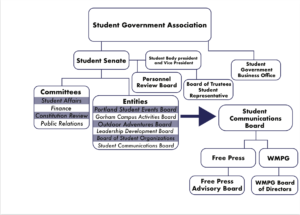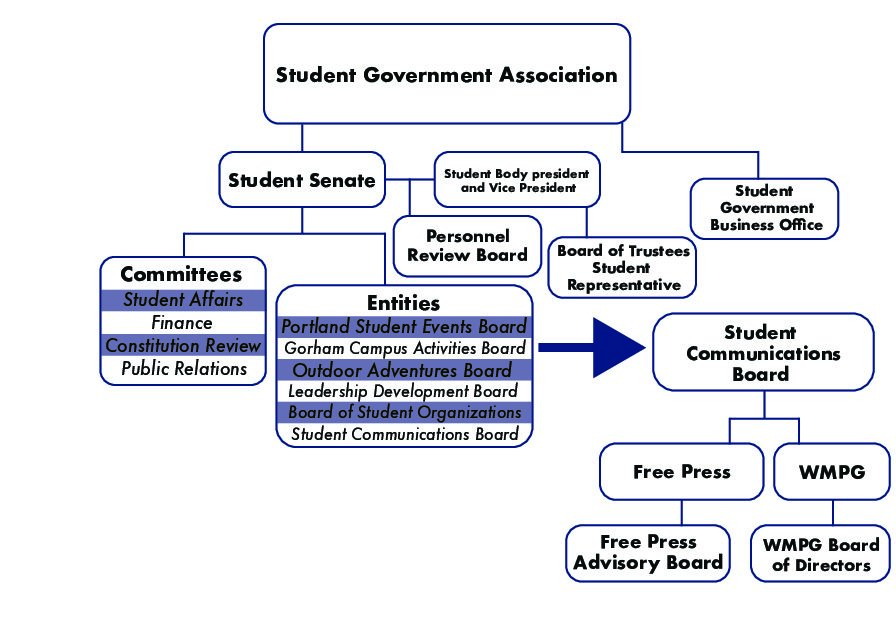By Cooper-John Trapp, Staff Writer
Despite being hamstrung by low numbers and turnover, the Senate has accomplished and facilitated several projects for the benefit of the student body this past semester. For perspective, the senate is proscribed 27 senators, but only 12 seats stand filled currently.
Shaman Kirkland, current Chair of the Student Senate, says that the Senate has not been attractive for the past two years and that scandals and stress has driven prospective students away.

To him, however, “We’ve moved beyond that.” Now, Kirkland believes, it’s a matter of getting that message out to the student body.
This semester, the Senate extended free printing during finals. Starting April 30, printing on all USM campuses is free. Traditionally, this program is given for only one week before finals, but the Senate chose to extend that to two weeks.
Another move approved by the Senate is designated parking spots for combat wounded veterans. On both campuses, signage will be used to designate the spots, which will be situated close to doorways for ease of access, says Chase Hewitt, current Student Body Vice President.
Otherwise, internal business has consumed the Senate. Resignations and proposed changes to the financial system of the Student Senate dominated previous Senate meetings.
On April 13, Trevor Hustus, former Chair of the Senate and Chase Hewitt, former Student Body President both stepped down. Hustus explains, “I resigned for personal reasons and to pursue appointment to University of Maine System Board of Trustees,” to which he will be appointed May 1. He adds, “I have full faith and confidence in the new leadership team and wish them the best in the future.” Former Student Body President Chase Hewitt returned to the Student Government Association (SGA) as current Student Body Vice President.
A proposal to change the way funding is handled within the SGA was tabled at the Senate’s meeting on April 20. The first paragraph of the proposal, which sparked controversy and confusion among Senators and student organizations, states:
“The Student Senate of the University of Southern Maine hereby endorses, permits, and facilitates the transfer of our current financial mechanism away from the Student Government Association Business Office to the University of Southern Maine Business Office…”
Many Senators and students who are a part of the SGA feel that the next year will be dedicated to rebuilding the Senate. Averi Varney, Student Senate Clerk, believes measures to ensure such success include entrance interviews and a formal orientation regarding the constitution and proper legislative procedures (such as Robert’s Rules of Order).
Shaman Kirkland believes that the recent pattern of executive members stepping down from their positions was due to the stress of the job and lack of education about the duties expected of them. They are trying to balance school, work and personal lives with the expectation many have of senators to be fully-functioning professionals.
Varney recognizes that this creates an uphill battle for those students.
Many students hold the view that the Senate solely exists to do projects, she says. “We want to [do projects], but first we have to make sure that we fulfill our basic responsibilities,” which is primarily to dispense the $400,000 of Student Activity Fees. Each student pays $135 toward the fee that funds events on campus, organizations and student-lead initiatives.
Despite the importance of that role, Kirkland explained, “Senators don’t feel rewarded because they don’t have substantive projects to do.” This happens more frequently for Senators that don’t hold high positions. Even if the Senate is working on a meaningful project, insufficient communication between the Executive Board and other Senators often leave the latter feeling uncommitted.
“The past year has been chaos, but chaos happens before we can get better,” Katelyn Seavey, the upcoming Student Body President, holds.
Seavey is new to the SGA at USM and wishes to build transparency in the next session, both within the senate and student government as well as with the student body as a whole.
Next year promises action in many fields. A gubernatorial debate, planned for mid-September in Hannaford Hall, is in the works, as is formal clothing drive for students to conduct professional interviews.
A promising program the Senate plans to expand is the textbook reserve operated through the USM libraries. Students can borrow a needed textbook for a certain short period of time, helping to alleviate some of the financial burden purchasing or renting textbooks every semester brings.
For Varney, next semester represents a re-branding opportunity for the Student Senate, to make it “more organized and enjoyable to be in.” Varney says, “I want [the Senate] to be a welcoming and stimulating environment where people come because they want to do something, not to put it on their resume.”
Alex Holderith, the current Student Body, agrees that public image is an area of growth. “People don’t take what [the Senate] does seriously, and no one knows who the President or Vice President are,” he states.
Holderith references the recent SGA elections, held in late March, for his case. The election garnered just 80 votes, or barely one percent of the undergraduate student population.
“[It’s] literally so easy to join, but nobody knows how to. It would be ‘huge’ if more students joined,” Holderith added. “You can make a real, tangible difference on campus if you are motivated.”
The SGA and Student Senate section of the USM website currently lists meeting locations and times, their Constitution, the roster of elected officials, meeting minutes (minutes only accurate as of April 2017) and financial request forms.
However, Holderith points out that in his experience, the website is confusing to navigate. “The system needs to change,” he says. “It needs to be a one-stop-shop.”
The past year has been one of turbulence and upheaval in the Student Senate. But, the new slot of senators who weathered the storm feel confident in the task that lies before them: to repair the image, expand the participation and rebuild the functioning of the Senate once more.
**Article was updated on 5/01/18 to fix a grammatical error**

